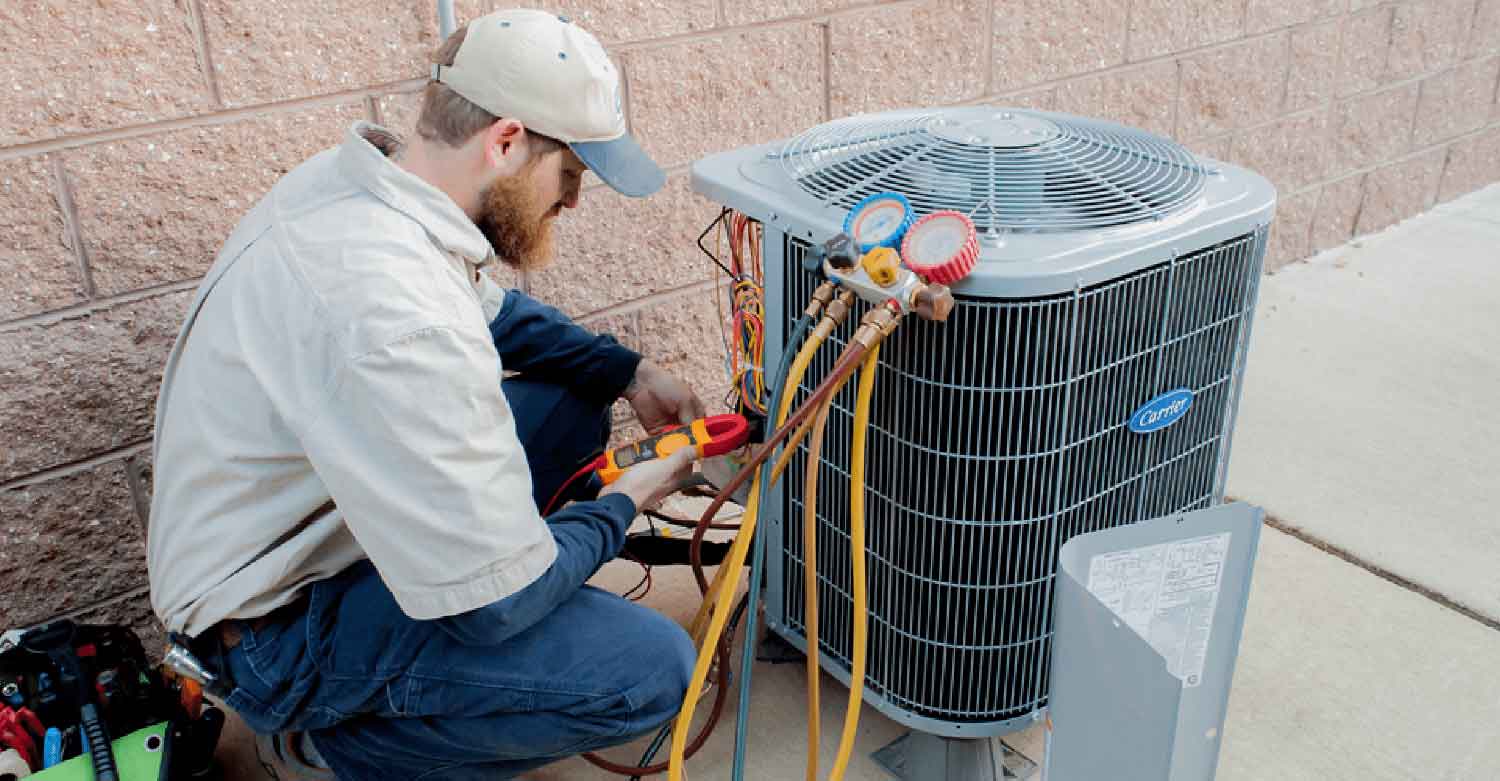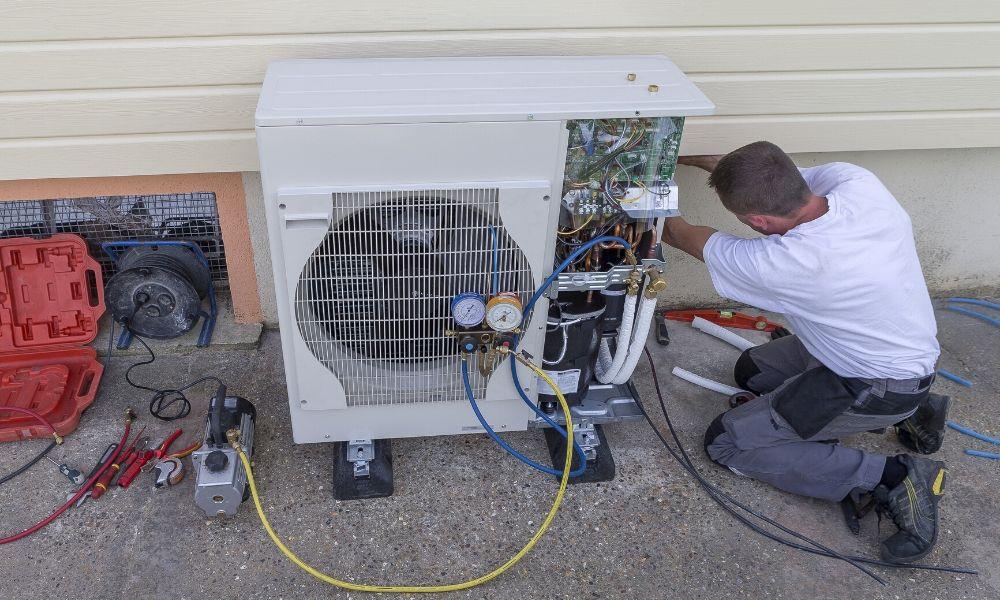Certain limitations do apply, please call for more details.
For Service Now, Call Us Right Now!
- HVAC Contractor
- HVAC Repair
- HVAC Installation
- Furnace Repair
- Furnace Installation
- Heat Pump Repair
- Heat Pump Installation
- Central Heating Repair
- Central Heating Installation
- Heating and Cooling Repair
- Heating and Cooling Installation
- Air Conditioner Repair
- Air Conditioning Installation
- Air Duct Cleaning Services
- Ductless Heating and AC Services
- Install AC
- Install Ducts and Vents
- Install Heating System
- Install Thermostat
- AC Maintenance
- Heating Maintenance
- HVAC Maintenance
- Repair AC
- Repair Ducts and Vents
- Repair Heating System
- Repair HVAC
- Repair Thermostat
- Clean Ducts and Vents
off



How to Prevent Air Conditioner Repair
You may not need air conditioner repair immediately, but it's always a good idea to have it checked at least once a year. Most problems are minor, and the solution can be easy to find. Simple things like clogged air filters or damaged ductwork can be fixed easily. If you don't have the time to wait for a professional technician, you can perform the basic maintenance yourself. Here are a few ways to make sure that you're preventing your air conditioner from breaking down.
Check the circuit board: You may notice leaks or faulty thermostat readings if your circuit board is faulty. If so, replace it immediately. The circuit board is an electronic component that runs the AC and is responsible for determining the voltage. If it's faulty, you may experience significant malfunction or have active drips or condensation. A clogged air conditioner unit can also cause the unit to cycle up and down or produce excessive noise and humidity.
Troubleshooting your AC's problem. One of the most common problems is the drain. This is the most common problem and can be fixed at home at a minimal cost. A clogged drain line can cause mold and mildew to form, making the inside of your home smell musty and damp. You should also call an air conditioner repair technician if you notice any of these problems. A technician can diagnose and fix the problem quickly.
Cleaning the condensate pan and drain line: Regularly check the condensate pan and drain line for a clogged drain line. This could be a sign of an underlying problem. This can be as simple as a small piece of wire or a wire stuck in the hole. Depending on the source of the clogged pan, you may need to replace the condenser. In this case, it may be necessary to replace the entire condenser.
If the drain line is clogged, contact an AC repair technician immediately. This issue may not be as obvious as a clogged drain. Water or frost buildup on the drain lines can result in a leaking unit. Warm air from a clogged drain line is a sign of a clogged drain line. It might be a leaking filter or a leaky pipe. The filter could be damaged and require repairs.
Other air conditioner repairs are less obvious but can be costly, especially if they are too minor. A clogged drain line can be caused by a faulty circuit board. It's an electronic system that controls the voltage of your AC and regulates its temperature. When a bad circuit board stops working, your AC will no longer be able to function correctly. This can result in a large malfunction in the AC. If the drain line is clogged, you may even experience squeaking or grinding sounds, which could indicate a clogged part.
The most common causes of air conditioner problems include a clogged drain, a broken condenser, or a tripped circuit board. If the drain is clogged, it can cause a lot of problems. A clogged drain could cause an AC to shut down, or a leaky unit. To prevent this, it's a good idea to check the drain line yourself. If the drainage is clogged, contact an air conditioning repair specialist.
Another common AC repair is a clogged drain. This can cost anywhere from $100 to $150. While it may seem like a minor problem, it may be an indication of a major problem. A clogged drain can cause a malfunctioning AC, or cause it to malfunction. It's important to get your air conditioning system checked as soon as possible. The sooner you can find the source of the problem, the better.
Often the problem is not obvious. If there's water around the unit, you may have a clogged drain line. If your AC is leaking, you can have it checked by an air conditioning repair expert. A clogged drain line can also cause a lot of problems, including a malfunctioning thermostat. If your air conditioner is making squeaking or grinding noises, it might be a clogged drain.
Key Benefits
Our approach has been simple. Provide a competitive price using qualified HVAC technicians with no hidden fees, backed by a 100% guarantee on workmanship. Our HVAC contractors are available now for any heating and cooling repairs or installation services for your home or business.
Professional Team
Factory Trained Technicians: We only employ factory trained technicians, they’re the best in the industry. Your work will be done right the first time.
Work done on Time
With over 25 years of experience in the industry, we boast all of the knowledge and expertise needed to handle even your most stubborn HVAC issues.
24/7 Emergency Service
We have technicians available for all heating and cooling jobs and we are available 24/7
Award Winning Firm
We are dedicated to the pursuit of excellence and the demonstration of high professional standards.
More Information
How Much Does It Usually Cost to Repair AC?
The first thing you should ask yourself is how much does it usually cost to repair your AC. The average cost for a repair of an air conditioner ranges from $30 to $300. Some common issues with AC units are electrical. Faulty relays, fuses or circuit breakers can cause your unit to malfunction. A HVAC contractor can help you determine if a repair or replacement is needed. Once you know the exact cost, you can hire a contractor.
The cost of repairing an AC depends on the type of repair needed. Minor repairs don't require expensive parts or labor and can be completed in less than 30 minutes. Serious repairs, however, will require more time, labor, and more expensive replacement parts. Depending on the extent of the problem, a repair can cost almost as much as replacing the entire unit. Before hiring a repair technician, make sure to find out the warranty for your AC. If you have a warranty on the system, this will lower the cost even more.
Minor AC repairs are not expensive. Usually, you just need to replace a few parts. Major AC repairs, however, are more expensive and require a technician to replace parts. In the case of an AC repair, a technician will need to purchase new parts and spend more time to complete the repair. If you're lucky, you'll still have the warranty on the parts and labor, so you can save even more money.
Why is My AC Running But Not Cooling?
The first step in diagnosing the issue is to check the thermostat to make sure it is turned on. The AC system is not working properly if the thermostat is not set to cool. To solve this problem, turn the AC back on and set the thermostat to auto or cool. If the thermostat is set to heat, this can cause the AC to stop working properly. Also, if the system is taking batteries, check and replace them.
Another possible reason why the AC is not cooling is because of the condenser, which is part of the outdoor unit. When the condenser is blocked, the system cannot cool the room. The condenser is located outside the home and is likely to have dirt and other debris in it. To fix this issue, clean the condenser. Your thermostat has settings that can be set to prevent this from happening.
Check the thermostat. Ensure the thermostat is set to cool. If it is not, you may need to replace it. Changing the thermostat will help you to fix the problem. A defective capacitor can lead to the AC not cooling your house. In some cases, the air registers can be clogged. To check the air registers, you can simply unscrew them and clean out the debris. If the problem persists, you should replace the compressor.
How to Fix an Air Conditioner That is Not Cooling
The most basic way to troubleshoot an air conditioner is to check the thermostat. If it is set to COOL, turn it back to that setting. If it is set to HEAT, turn it back to the cooling operation and check again. If the compressor fan isn't spinning, try pushing it with a long screwdriver or thin stick. It may not be the problem, but you need to replace the capacitor.
First, check the thermostat. If the compressor is not turning on, the thermostat may be broken or not wired properly. If it is not working, check the condenser and the fan. If the condenser and the fan are running, then the condenser is probably the culprit. However, if these are the only things wrong with the air conditioning system, it's time to call an AC repair service. If you've already contacted a company, they'll be able to provide a more detailed estimate of the problem and possible solutions.
In rare cases, a problem with the thermostat may be the cause of the problem. In this case, you'll need to contact a HVAC service technician for further assistance. If you are unsure, you can try turning the thermostat back to cool and listen to it kick on. If the air conditioner doesn't kick on, you can also try adjusting the settings of your thermostat. If the temperatures have been higher than normal, make sure that the setting on the thermostat is set to cool.
The Lifespan of an Air Conditioner
As with any mechanical device, air conditioning units can have a lifespan of fifteen to twenty years. Whether you're living in a warm climate or not will affect how long your air conditioner will last. Common signs that it's time to replace it include compressor failure, condenser corrosion, and leaks. You should also do regular maintenance on your unit. This will help ensure that your air conditioner will keep cooling your home for years to come.
The lifespan of your air conditioning unit depends on a few factors. The first is where it's installed. The location of your air conditioning unit will affect its lifespan. Outdoor units are often subject to harsh weather conditions, and are more likely to become clogged. They will have to work harder to cool your home, which increases the risk of repairs. To extend the lifespan of your system, you should start planning ahead.
Modern air conditioners typically have a lifespan of around 10 to 15 years. Many manufacturers will cover repair costs for ten years or more if you keep your air conditioning system running at its optimum level. Even in the hottest climates, the lifespan of an AC unit is significantly lower than you'd expect. But you can extend its life by doing a little planning, spring maintenance, and regular maintenance.
Where are your service locations?
Award winning work
Expert, guaranteed workmanship. Warranty on Parts & Labor
We are accountable to each other and the community we have sworn to serve. We are dedicated to the pursuit of excellence and the demonstration of high professional standards.


